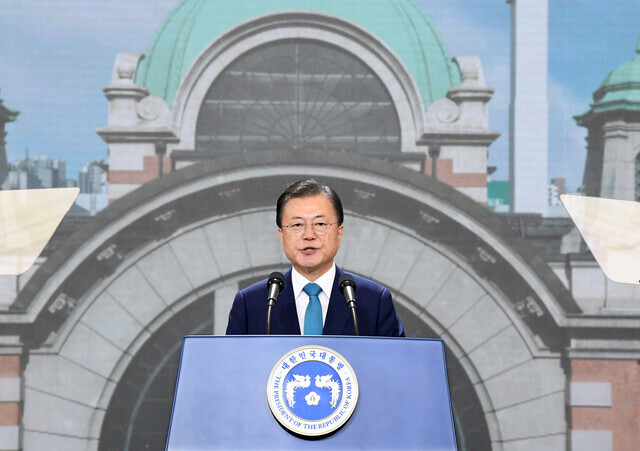hankyoreh
Links to other country sites 다른 나라 사이트 링크
[Editorial] Moon leaves door open for dialogue with Japan, but Suga makes no mention of Japan’s responsibility for WWII

South Korean President Moon Jae-in said that Seoul has “always kept the door open for dialogue” with Japan in remarks commemorating the 76th anniversary of Liberation Day, when Korea was liberated from Japanese colonial rule.
While Moon didn’t have a new proposal for Japan on the final Liberation Day of his presidency, his speech did call for improving relations through dialogue.
“Since normalizing diplomatic relations, Korea and Japan have long been able to achieve economic growth together through a division of labor and cooperation based on the common shared values of democracy and a market economy. This is the direction our two countries should continue to go in,” Moon stressed.
The apparent reason Moon didn’t make a new offer to Japan is that he has concluded it’s impossible to resolve the logjam in relations with Japan before he leaves office. The two countries’ relationship is weighed down by export controls imposed by Japan and South Korea’s demands for compensation for victims of forced labor and sexual slavery.
Moon reiterated the principle that historical issues should be resolved “through actions and practices that are consistent with universal values and the standards of the international community.”
Moon quoted a speech made by Ahn Jae-hong, vice chairman of the Preparatory Committee for National Construction, on the day after Korea’s liberation, in which Ahn said the two countries should “move toward an equal and mutually beneficial relationship.” Moon described Ahn’s remarks as encapsulating “a bold and inclusive sense of history that transcends the victim mentality of the colonized.”
In effect, Moon reiterated his view that the two countries should improve their relationship and move toward cooperation while also resolving historical issues in a principled manner.
But once again, Japan exhibited a disappointing attitude. Japanese Prime Minister Yoshihide Suga made no mention of Japan’s responsibility for World War II in a memorial service for fallen soldiers on the 76th anniversary of the end of the war, just like his predecessor Shinzo Abe.
Suga only emphasized what the Japanese suffered, including the atomic bombs dropped on Hiroshima and Nagasaki. There was a complete absence of the “deep remorse” and “expression of consolation” mentioned by previous prime ministers about Japan’s history of aggression, including its invasions of other countries and colonization of the Korean Peninsula.
Instead, Suga reiterated the “proactive pacifism” advocated by Abe, who had sought to expand Japan’s military role. He also made a votive offering to the Yasukuni Shrine in Tokyo, which honors Japan’s war dead, including some of the worst war criminals of World War II. Meanwhile, Defense Minister Nobuo Kishi and four other cabinet members paid personal visits to the shrine.
Those steps aptly illustrate Japan’s increasingly severe lurch to the right.
Given rapid changes in the international order, including the rivalry between the US and China, cooperation between South Korea and Japan is more critical than ever. But if Japan’s political leaders continue to reject contrition and cling to regressive attitudes, Japan no longer has any right to talk about future-oriented relations with South Korea.
Please direct comments or questions to [english@hani.co.kr]

Editorial・opinion
![[Guest essay] Amending the Constitution is Yoon’s key to leaving office in public’s good graces [Guest essay] Amending the Constitution is Yoon’s key to leaving office in public’s good graces](https://flexible.img.hani.co.kr/flexible/normal/500/300/imgdb/original/2024/0416/8917132552387962.jpg) [Guest essay] Amending the Constitution is Yoon’s key to leaving office in public’s good graces
[Guest essay] Amending the Constitution is Yoon’s key to leaving office in public’s good graces![[Editorial] 10 years on, lessons of Sewol tragedy must never be forgotten [Editorial] 10 years on, lessons of Sewol tragedy must never be forgotten](https://flexible.img.hani.co.kr/flexible/normal/500/300/imgdb/original/2024/0416/8317132536568958.jpg) [Editorial] 10 years on, lessons of Sewol tragedy must never be forgotten
[Editorial] 10 years on, lessons of Sewol tragedy must never be forgotten- [Column] A death blow to Korea’s prosecutor politics
- [Correspondent’s column] The US and the end of Japanese pacifism
- [Guest essay] How Korea turned its trainee doctors into monsters
- [Guest essay] As someone who helped forge Seoul-Moscow ties, their status today troubles me
- [Editorial] Koreans sent a loud and clear message to Yoon
- [Column] In Korea’s midterm elections, it’s time for accountability
- [Guest essay] At only 26, I’ve seen 4 wars in my home of Gaza
- [Column] Syngman Rhee’s bloody legacy in Jeju
Most viewed articles
- 1[Guest essay] Amending the Constitution is Yoon’s key to leaving office in public’s good graces
- 2[Guest essay] How Korea turned its trainee doctors into monsters
- 3Faith the power of memory: Why these teens carry yellow ribbons for Sewol
- 4[Editorial] 10 years on, lessons of Sewol tragedy must never be forgotten
- 5[News analysis] Watershed augmentation of US-Japan alliance to put Korea’s diplomacy to the test
- 6US grants Samsung up to $6.4B in subsidies for its chip investments there
- 7How Samsung’s promises of cutting-edge tech won US semiconductor grants on par with TSMC
- 8‘National emergency’: Why Korean voters handed 192 seats to opposition parties
- 9Korea ranks among 10 countries going backward on coal power, report shows
- 10[Column] A death blow to Korea’s prosecutor politics